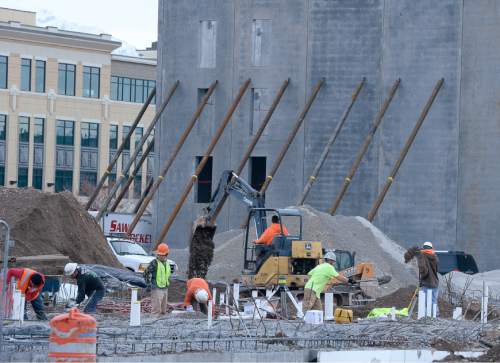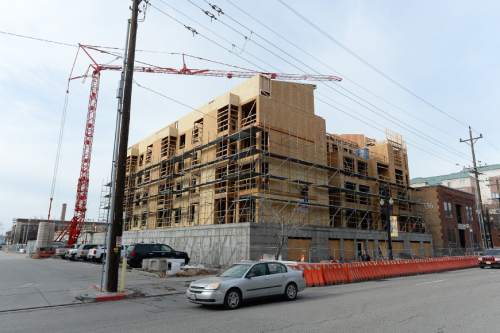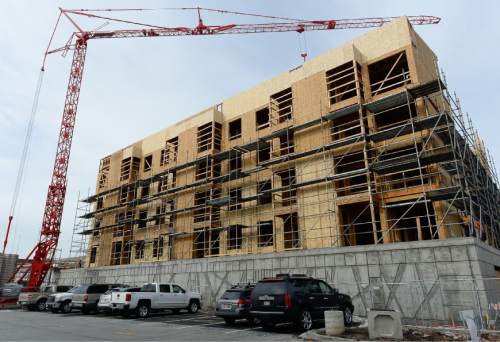This is an archived article that was published on sltrib.com in 2016, and information in the article may be outdated. It is provided only for personal research purposes and may not be reprinted.
Utahns are overwhelmingly positive about the state's economy and more than half of workers received a raise in the past year, according to a new poll commissioned by The Salt Lake Tribune and the Hinckley Institute of Politics.
The state seems awash in economic accolades, mostly focused on strong job growth, the plummeting unemployment rate and investment in the tech field. So it may seem odd that the state's economists are breathing a sigh of relief after finishing their latest annual review.
That's because wages in Utah are rising again — finally.
"It has been a long time coming," said Natalie Gochnour, director of the Kem C. Gardner Policy Institute at the University of Utah. "I think the consensus is we are going to see stronger wage growth in coming quarters — and I think it is necessary."
The state saw annual average pay rise 3 percent in the past year to roughly $44,000, and that's on top of a 2.7 percent jump in 2014, numbers highlighted in a new report to the governor to be released Wednesday morning. This marks the first solid increase since the Great Recession. It's giving experts such as Gochnour hope the state has turned the corner, and it comes just a year after these same leading economic minds warned Gov. Gary Herbert: "A lingering shadow over the state's labor market picture is slow wage growth."
The Tribune/Hinckley Institute poll, conducted by SurveyUSA, asked 989 registered voters to rate the economy; 15 percent said it was excellent, 54 percent said good, 27 percent said fair and 3 percent said the economy was poor.
Of those who are working, 53 percent said they received a raise in the past year and an additional 23 percent saw a pay bump within the past two years. The poll also found that 12 percent of respondents say they've gone without a pay raise for more than four years.
While the Tribune/Hinckley Institute poll shows optimism, respondents to the monthly Zions Bank Consumer Attitude Index were more hesitant. This study, conducted by Dan Jones & Associates, asks people how likely it is that their household income would increase more than inflation in the next two years. Throughout 2015, between 10 percent and 14 percent said that was either likely or very likely, while about 30 percent said it was a 50-50 shot and roughly 45 percent said it was unlikely. About a third of the respondents expected to get a raise in the next six months.
Steve and Robin Ayers, of Salt Lake City, have ridden the economic wave in recent years and have emerged bullish on Utah's economy. Steve Ayers works as a landscaper during the summer, and he's employed at the St. Regis Deer Valley Resort in the winter.
When the economy tanked in 2008, landscaping jobs started to dry up and the resorts had empty rooms. Now Ayers is plenty busy. The resort is near capacity each day, and he already has lined up landscaping customers from March through November.
"He has more of them than he can really schedule now," said Robin Ayers, who answered the Tribune/Hinckley survey. "That is a big improvement."
On top of that, he has received a pay bump.
Following simple economics, this should have happened before. The basic equation is this: High job growth plus low unemployment rate equals employers who need to raise wages to get workers.
Utah has been a leader in the nation in job growth for the past few years and has seen the unemployment rate crater to 3.7 percent. But Gochnour and experts like Carrie Mayne, chief economist at the Utah Department of Workforce Services, watched nervously as the wage increases were statistically tiny, if existent.
They came up with some theories as to why this was happening. Utah saw more job losses in the recession than many states — 92,000 jobs — meaning it should have taken longer to recover. And the low unemployment rate, ranking in the top 10 in the nation, is a bit deceiving. It counts only people who are actively trying to find a job. Those who gave up looking don't count in that stat, though they could easily return to the job hunt at any time. Some of those people have returned, meaning employers didn't have to pony up to fill jobs.
"That was what we believe has happened to keep wages low," Mayne said. "We knew that it couldn't last forever. At some point, the labor market has had to tighten."
Utah workers traditionally earn less here than many of their national counterparts; on top of that, even in 2014, the state's wage growth ranked 33rd in the nation. Part of that is due to the state's young workforce. People early in their careers make less than they do as they gain experience.
Another issue is that much of the job growth took place in lower-wage industries such as retail and hospitality. But the state has seen strong growth in the higher-paying tech and financial-services sectors, and perhaps a big driver of the state's job growth is the recent construction boom. Crews are building a state-of-the-art airport, new downtown apartment buildings and homes and businesses along the boundary between Utah and Salt Lake counties.
"We weren't going to have growth in wages until we got construction jobs back," said Gochnour, who noted the state lost 40,000 well-paying construction-related jobs during the recession.
There's also a psychological aspect that can defy basic economic theory and projections. She said employers were skittish about hiring more people or giving raises in the years since the recession, in part because they didn't want to have to let people go again if the economy suddenly shrank. And workers have been happy just to have a job, making them less likely to hunt for other employment or ask for a raise.
Gochnour thinks reluctance is no longer needed. She believes more confident employees and expansion-minded business leaders are poised to keep Utah's economy humming throughout 2016.
"It is good for Utah's economy to have stronger wage growth," she said. "It is time."







